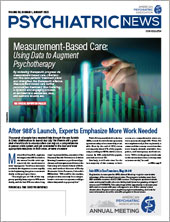According to data from the Centers for Disease Control and Prevention (CDC), 1 in 44 8-year-olds, or about 2.3%, was diagnosed with autism spectrum disorder (ASD) in 2018. That figure represents a 24% increase over the CDC’s 2016 estimate and a roughly 400% increase over the CDC’s estimate in 2004.
That’s an astronomical increase, noted M. Frampton Gwynette, M.D., a professor of psychiatry and behavioral sciences at the Medical University of South Carolina, at the American Academy of Child and Adolescent Psychiatry’s (AACAP) 2022 annual meeting in Toronto. He explained that the increase is mostly due to greater diagnoses and recognition of the disorder. “However, there are significant genetic factors driving the prevalence,” he added. “We now know that 70-plus genes are currently linked to autism.” Older parents are also more likely to have children with ASD, and some environmental factors have been linked to the disorder, although many unanswered questions remain around those potential factors and how they impact prevalence.
Gwynette and his colleagues updated AACAP attendees on the assessment and management of ASD and the associated psychopathologies. Topics included the increase in prevalence, greater understanding of gender differences, genetic testing, and the importance of continuous assessment of patients and the therapies they are receiving.
“Nearly 10% of the population in our psychiatry clinic are diagnosed with autism spectrum disorder,” said Gagan Joshi, M.D., director of the Autism Spectrum Disorder Program at Massachusetts General Hospital. Joshi and Roma Vasa, M.D., chaired the session.
Psychopathologies are among the most frequent comorbidities for patients with ASD, particularly attention-deficit/hyperactivity disorder (ADHD). When psychopathologies are present, Joshi said, the diagnosis of autism is more likely to be delayed.
“This is a very important message to clinicians,” he said. “As psychiatrists, we see individuals with emotional and behavioral difficulties in our clinics, and we must be mindful that autism is underrecognized in psychiatrically referred youth or adults. … We must screen this population for autism to identify the disorder and provide the specific treatment.”
Further, the ways in which autism and behavioral problems present change as children age. “Autism is not static,” Joshi said. “We need to closely monitor these patients because what we offer the patient today may not be relevant tomorrow, and we need to be very mindful of that.”
Diagnosing autism in young children who also have an internalizing disorder can be difficult because there are many overlapping symptoms between anxiety and depressive disorders and ASD, explained Vasa, who is the director of education and training at the Kennedy Krieger Institute. “It’s really important to get a baseline understanding of the child’s ASD symptoms to understand how the child functions at their best and among ongoing stressors,” she said.
Further, the evidence base for using pharmacological treatments for anxiety and mood disorders is sparse in patients with ASD. “So we follow the algorithms that we use when treating individuals without ASD, but we prescribe cautiously, try to minimize polypharmacy, and follow up closely,” Vasa said.
Genetic tests should also always be offered when assessing individuals for ASD, said Takahiro Soda, M.D., Ph.D., director of the University of Florida Health Center for Autism and Neurodevelopment. “A molecular diagnosis can provide a diagnostic resolution to patients and their families, many of whom have been undergoing diagnostic odysseys for years,” he said. He also noted the sheer number of different genes that are now known to contribute to the risk of ASD. It’s more important to know how to order genetic diagnostic tests and determine the next steps than it is to try to keep track of all the different diagnostic features of the increasing number of molecular diagnoses, he said.
During the question-and-answer session, the experts spoke in detail about social skills training. Elizabeth Laugeson, Psy.D., discussed the Program for the Education and Enrichment of Relational Skills (PEERS). She is the founder and director of the University of California, Los Angeles, PEERS Clinic. PEERS is evidence based and includes social coaching for parents and caregivers.
She pointed out that social skills training is often ineffective for neurodivergent youth. That is because many programs do not include parents and caregivers, and the skills taught often don’t generalize to other settings. Instead, children and adolescents with ASD need other people in their lives who can support them in applying the skills they need in the real world.
“It’s important that psychiatrists assess the landscape of autism,” Vasa said. “We have to assess children’s social experiences and adverse experiences, and we must also assess the quality of therapies they’re receiving and the efficacies of those therapies to make sure they’re safe, feasible, and effective.”
Families of children with autism often participate in multiple therapies and services, she continued. Psychiatrists can work with families to evaluate the different therapies the child is receiving, what strategies are working, and what the evidence says. “We can make decisions collaboratively with the parents and the children,” Vasa said. ■
